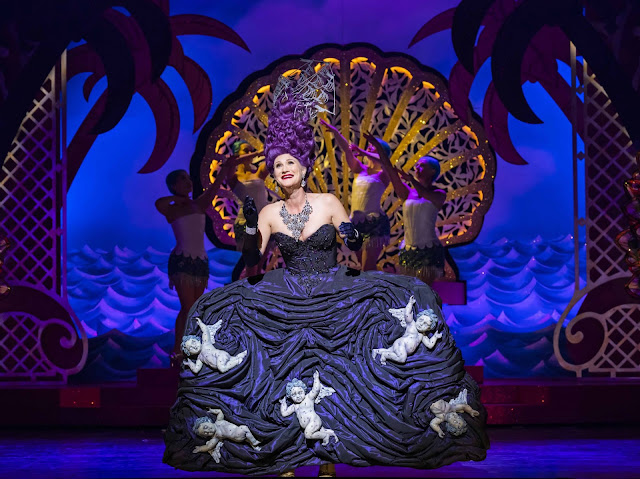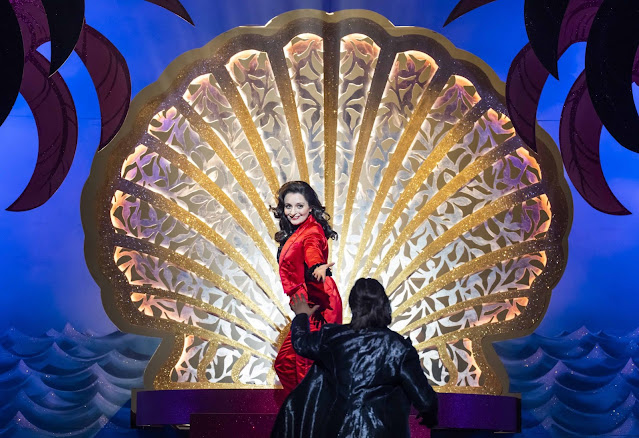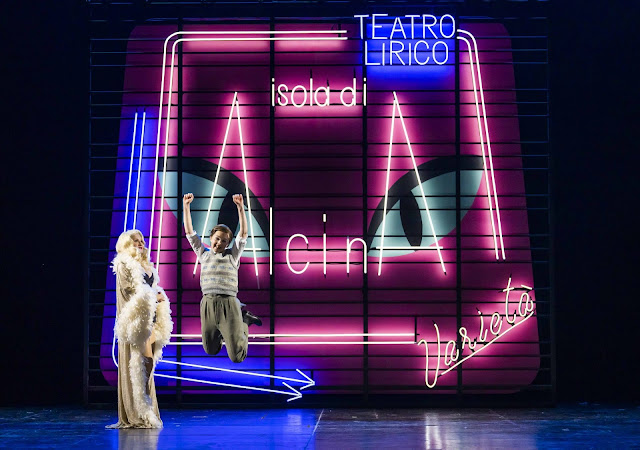 |
| Handel: Alcina - Jane Archibald - Glyndebourne Opera (Photo Tristram Kenton) |
Handel: Alcina; Jane Archibald, Svetlina Stoyanova, Soraya Mafi, Beth Taylor, Rowan Pierce, Thomas Elwin, dir: Francesco Micheli, Orchestra of the Age of Enlightenment, cond; Jonathan Cohen; Glyndebourne Opera
27 July 2022 (★★★★½)
The magic of Alcina recreated as a 1950s showgirl in a lavish production that combined spectacle with performances at the highest level
When Handel wrote Alcina, he had parted company from most of the stars of his opera company and had been forced to seek a new theatre. But, ever the practical man of the theatre, he made the best of the circumstances. The Covent Garden Theatre, where Handel gave his next few seasons, was known for its spectacular productions, there was also a small chorus available and for the first season, a dance troupe led by Marie Sallé. Handel would create the ballet, Terpsicore, for Sallé and would include dance into both Ariodante and Alcina. Ariodante would feature a complex integration of dance and drama, though it is likely that the opera was never performed in the form that Handel originally wrote it.
Alcina is based on Ariosto's Orlando Furioso, a poem that composers regularly mined for operatic plots. Handel had already written Ariosto-based operas, and his patrons would be completely familiar with the essentials of the plot. The opera represents a return to the exotic magic-based operas of Handel's early days in London (Rinaldo, Teseo, Amadigi di Gaula), again with a sorceress who, though technically not on the side of good, to whom Handel shows great sympathy. It was a plot perfectly designed to show of the spectacular settings of the Covent Garden Theatre, and we should imagine those first audiences being spellbound by the settings, by the combination of visuals, music and dance.
Few modern directors, however, are interested in the mechanics of Handel and his librettist's plot. The libretto describes the final scene as taking place in 'A Prospect of the Splendid Palace of Alcina surrounded with Trees, Statues, Obelisks and Trophies, and Dens of wild Beasts; an Urn rais'd in the Middle which incloses the whole Power of the Inchantment' and the ending to the scene includes a moment when Ruggiero 'throws down the Urn and breaks it, when the Scene wholly disappears, changing to the Sea, which is seen thro' a vast, subterraneous Cavern, where many Stones are chang'd into Men; and among them is Astolfo, who embraces Oberto: They form the Chorus and they Dance'.
Now, how often have you seen that represented in a production of the opera?
 |
| Handel: Alcina - Soraya Mafi - Glyndebourne Opera (Photo Tristram Kenton) |
We caught a performance of Francesco Micheli's production of Handel's Alcina at Glyndebourne Opera on 27 July 2022. Jonathan Cohen conducted the Orchestra of the Age of Enlightenment, with Beth Taylor as Bradamante, Alastair Miles as Melisso, Soraya Mafi as Morgana, Jane Archibald as Alcina, Rowan Pierce as Oberto, Svetlina Stoyanova as Ruggiero, Thomas Elwin as Oronte and James Cleverton as Astolfo. Set designs were by Edoardo Sanchi, costumes by Alessio Rosati, choreography by Mike Ashcroft and lighting by Bruno Poet.
Micheli and his designers transferred Alcina's magical island to a variety theatre in 1950s Italy, where Jane Archibald's Alcina seduces young men and transforms them not into wild beasts but into dumb audience members. Sanchi had designed not so much a set as a series of elements which were fluidly moved around the stage, a large neon sign advertising the review, Alcina's Island, a spectacular set for Alcina's production numbers, a box for the audience, the theatre bar, plus a selection of back-stage areas. Micheli recognised that an important element in Alcina is that we understand that everything we see is created, the 'magic' is not real, and so large elements of the production took place backstage, we saw Alcina going on and off stage, as well as seeing large-scale production numbers.
The production style was profoundly restless, the set seemed to be in constant motion and Micheli was at pains to keep something happening all the time. Often this was very effectively done, he had a way of making the drama progress that did not seem as if he was finding things to do until the aria ended, but the few moments of stillness in the production were very telling. I came away wishing that the set had been allowed to remain stationery more, and that singers could have been given more moments of stillness. You felt that, fundamentally, Micheli did not quite trust either the music or his audience, and wanted to make sure that his audience were constantly entertained.
In many ways, it was a very effective concept and for the first two acts the dramaturgy worked very well indeed. But the performative element of the concept, the idea that Morgana and Alcina were showgirls, meant that if an aria did not quite fit Micheli's concept, then it became a performance. So Alcina's 'Ah! mio cor', where she realises she has really fallen for Ruggiero and her magic cannot avail her, becomes more of a 'the show must go on' type of number as Archibald slapped on the grease-paint and went out and performed. The complexities of Morgana and Oronte's relationship really suffered in this way, and their whole crucial scene at the beginning of Act Three was turned into a front of curtain show, hastily improvised by Mafi's Morgana and Elwin's Oronte. You felt that Micheli never believed in, or was uninterested in, their relationship, and despite a star performance from Mafi, Morgana's character was under-developed.
The final act brought concept, dramaturgy and opera into a collision course, as Micheli struggled to get the music to follow his drama. The breaking of Alcina's power was oddly handled, and there was no chorus. Alcina is one of Handel's few operas to have a proper role for the chorus. Their role was completely cut from Act One, and the final chorus, when Alcina's victims come alive again, was sung by the principals as they read Ariosto's book. The danced finale seemed to suggest that Ruggiero, rather than breaking Alcina's power, took on her persona!
The result was lavish, imaginative and seductive, but marred by a final act where Micheli seemed unwilling to follow the music. What transformed it was the superb quality of the performances; this was Handel opera at the highest level and all concerned impressed greatly.
In the title role Jane Archibald dazzled with her command of the fioriture, and wonderfully conveyed this Alcina's demanding sense of entitlement. She was sassy in the showy numbers and brought a great strength to the line, but as Alcina's world crumbled, Archibald brought out the character's humanity, making us care and in 'Ah! mio cor' was profoundly touching.
As Ruggiero, Svetlina Stoyanova was simply mesmerising. She impressed with her ability to suggest the character's gender, but also hinting at a certain fluidity. Her voice was a wonderfully fluid and even instrument, seducing over all the range. There was a beautiful flexibility to her line, and in Ruggiero's earlier arias managed to suggest his passiveness in the face of Alcina's seduction, whilst not making him entirely dim. 'Verdi prati' was mesmerising with the liquid beauty of line, and whilst Micheli's conception of 'Sta nell'ircana' robbed it of some of its dramatic directness, there was no doubting Stoyanova's stunning delivery, and I look forward to seeing her in more Handel roles.
From the very opening notes of her first aria, Soraya Mafi demonstrated a beauty of tone and a pin-point delivery that was both poised and seductive. And whilst this came to dazzling fruition in ‘Tornami a vagheggiar’, done as a spectacular song and dance number, she also pulled heart strings in her final aria (unfortunately sung as a cabaret number rather than to Oronte).
Beth Taylor was an engaging Bradamante, using her strong chest register to great effect when colouring the music and making sure that Bradamante was vocally a very different colour to Stoyanova's Ruggiero. There was little that was demure to Taylor's Bradamante, she was feisty throughout and her account of Bradamante's Act Two aria where she berates Ruggiero wonderfully full blooded.
Tom Elwin (standing in for Stuart Jackson for the third time) made a gracious and stylish Oronte. Micheli seemed relatively uninterested in the character, but Elwin (who made his role debut as Rodolfo in Puccini's La Boheme earlier this hear) sang with an unfailing sense of style and engagement, and his final aria when he admits to us, but not to Morgana, that he still loves her, was touching indeed.
The character of Oberto is not in Handel's source libretto for the opera, the character was added specifically for Handel and principally because he had available the boy Savage [see my article], who as a treble must have been very capable indeed. Directors sometimes cut Oberto, and the role is tangential to Alcina's story. But Rowan Pierce not only incarnated a teenage boy incredibly and sang his arias with style, accuracy and engagement, but she made you care about his fate.
Alastair Miles made a sober Melisso, often the voice of reason and at one remove from the theatrical dazzle. James Cleverton was luxury casting as Oberto's father, Astolfo. Given a greater role in the drama by Micheli, Cleverton sang only in the final scene but was a strong presence throughout.
The dancers, Soledad de la Hoz, Chloe Dowell, Keiko Hewitt-Teale, Bianca Hopkins, Lily Howkins, Megan Francis King, Rebecca Lee, and Oihana Vesga, not only gave us engaging showgirl routines in Act One and at the end of the opera, but were a constant presence throughout, both front and back stage. One of the strengths of Micheli's concept was the way it made the dance an essential element of the piece, and Mike Ashcroft's choreography managed to neatly combine the look and feel of a showgirl routine with the requirements of Baroque dance rhythms.
In the pit, Jonathan Cohen and the Orchestra of the Age of Enlightenment matched the stage action both for musical quality and for dazzle. This was a vivid account of the score, from the engaging rhythms to the fine instrumental solo moments.
 |
| Handel: Alcina - Jane Archibald, Rowan Pierce - Glyndebourne Opera (Photo Tristram Kenton) |
This was a lavish and luxurious show that told its story with gusto and imagination. If that wasn't quite Handel's story, then the audience was barely worried and was rightly enthusiastic. What lifted the performance for me was the sheer quality of all the performances.
Never miss out on future posts by following us
The blog is free, but I'd be delighted if you were to show your appreciation by buying me a coffee.
Elsewhere on this blog
- French-style elegance, Italian lyricism and virtuosity: Adrian Butterfield in Leclair's violin sonatas - record review
- Prom 14: Flavours of late romanticism, Yamada and the CBSO in Rachmaninov and Ethel Smyth - concert review
- Sit back and enjoy: London Early Opera's engagingly virtuosic performance of Handel's pasticcio, Caio Fabbricio - record review
- More than just sisterhood: Mark Adamo's Little Women finally gets its UK premiere in Ella Marchment's imaginative production at Opera Holland Park - opera review
- From Bayreuth to Grimeborn: having assisted at Bayreuth Festival's new Ring Cycle, Peter Selwyn moves on to conduct the concluding parts of the Grimeborn Festival's ambitious Ring Cycle - interview
- Operatic rarities in a striking double bill: Delius' Margot la Rouge and Puccini's Le Villi at Opera Holland Park - opera review
- The Dragon of Wantley: a fine Handelian cast have terrific fun with Lampe's parody of opera seria - CD review
- Purcell writ large: a lavish Dido and Aeneas at the BBC Proms - opera review
- Our Future in Your Hands: Kate Whitley's new oratorio for Buxton used a chorus of children from local schools and students from the RNCM to terrific effect - concert review
- Baroque gem: Hasse's early serenata Antonio e Cleopatra gets an intriguing modern staging in Buxton with some stylish singing - opera review
- Not a kilt in sight: Jacopo Spirei's fascinating production of Rossini's La donna de lago at Buxton - opera review
- Rediscovered rarities, new opera and young artists: I chat to Rosetta Cucchi, artistic director of Wexford Festival Opera - interview
- ome











No comments:
Post a Comment